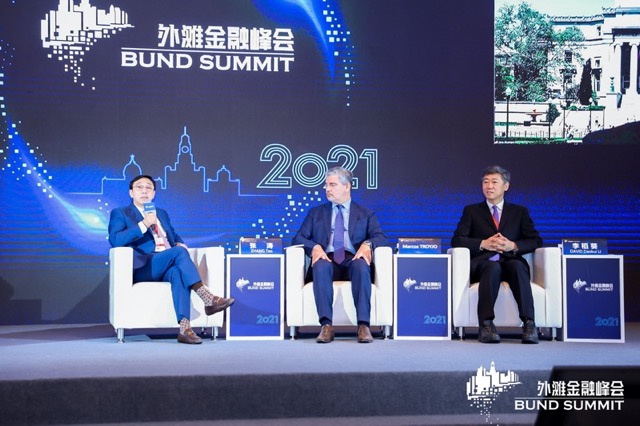David Daokui Li: Emerging Market Countries Will Face Four Major Challenges in Vaccines, Debt, Supply Chains, and Low-Carbon Development
This article was originally published in Chinese by Yicai on October 22, 2021. Written by Du Chuan and edited by Lin Jiechen. Translated by ACCEPT. For the original article in Chinese, click here.
“When I was in primary school, I learned that the world was divided into “three worlds.” From my perspective, nowadays the world can be divided into “three new worlds,” namely, developed countries, emerging countries, and China. Each of the three “worlds” is faced with its own challenges and has its own unique economic performance. The key is to recognize the emergence of the new pattern,” remarked David Daokui Li, Director of ACCEPT at Tsinghua University, on October 22 at the Bund Summit and Fifth Pushan Annual Meeting.

According to David D. Li, within this framework, “emerging markets” refers to emerging market countries other than China. He expects that these countries will face four major challenges in the coming years, related to vaccines, debt, supply chains, and low-carbon development.
At present, the global vaccine gap is constantly widening. According to estimates by the World Health Organization (WHO), only 3% of the entire African population had been completely vaccinated as of September 11.
According to The Least Developed Countries Report 2021 released by the United Nations Conference on Trade and Development (UNCTAD) on September 27, there are 46 least developed countries around the world. In these countries, the rate of COVID-19 vaccination is low—only 2% of the population has been vaccinated. However, in developed countries, the vaccination rate has already reached 41%.
David D. Li observed that the vaccination rate in developed countries now ranges between 50% and 70%. In emerging market countries, the vaccination rate is generally lower than 50%, and is estimated to range between 20% and 30%. In China, the vaccination rate has reached around 75%, and is still constantly growing. Emerging market countries must accelerate vaccination or the situation will become even more fragmented, making travel and trade increasingly difficult.
Specifically on the issue of debt, emerging countries are currently facing rapidly rising debt levels. According to David D. Li, the global debt level has increased by 12% over the past 18 months. “This figure is not a complete estimate. Emerging countries are also faced with hidden debt risks that may explode in the future. The world needs to collaboratively address these debt-related challenges,” he said.
With respect to supply-chain issues, David D. Li believes that “in three or four years, perhaps many developed countries will want to relocate certain production chains and supply chains back to their own countries, which will be utterly unfavorable to emerging markets. Originally, emerging markets could take over part of the production capacity from China or some developed countries to bolster their employment and economic upgrading, but now the situation seems more challenging.”
Historically, the Paris Club was set up to address debt problems. The Paris Club is an informal group of official creditors, mainly from industrial countries, which aims to find coordinated and sustainable solutions for debtors facing payment difficulties.
David D. Li believes that as the aforementioned issues are global challenges, they ought to be jointly resolved by returning to multilateralism. For instance, a “Shanghai Club” or “Shanghai Paris Club” could be established to provide special debt arrangements in a form similar to the Paris Club.
Last but not least, the issue of low-carbon development. For developed countries, achieving low-carbon growth has become the top priority in the post-pandemic era.
Nevertheless, David D. Li holds that the green energy sector has yet to become a full-fledged industry, and costs remain high. On the other hand, the market is also facing the dilemma of immature new technologies and outdated existing technologies. As a result, some countries have implemented tax hikes as an intermediate measure. Since developed economies do not rely heavily on energy, tax increases will not impose a huge impact, but tax hikes could pose severe challenges for emerging markets.
To address these challenges, David D. Li shared two main insights. First, we should pay closer attention to how equatorial countries prepare for and respond to disasters. The absence of a low-carbon strategy has led to climate change, with equatorial countries as the primary victims. Second, we must identify solutions for decarbonization. “The cost of carbon reduction varies in different economies across the globe. Therefore, decarbonization ought to emphasize the principles of upholding multilateralism and engaging in collaborative consultation,” said Professor Li.
David D. Li stressed that the key at the moment is to recognize the new pattern of the world. Continuing to talk about conventional approaches such as increasing the share of the World Bank is not an applicable solution. Instead, more focus should be placed on the new concept of governance proposed by the BRICS New Development Bank, so as to allow China and other countries to invest more money where it is needed most.




